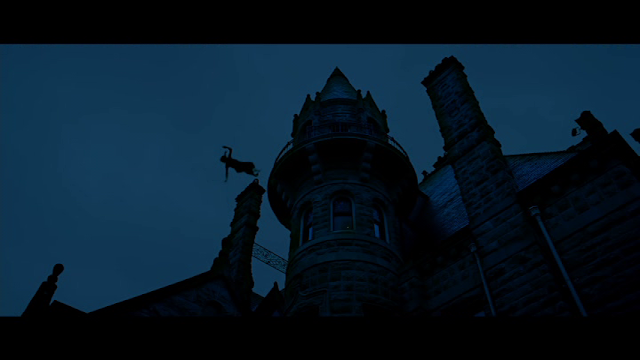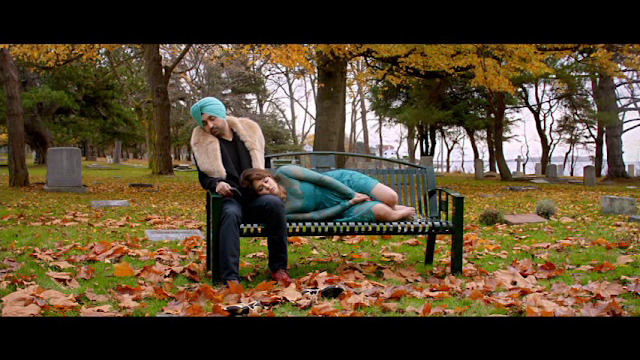I've joked before about the Yama Cinematic Universe, but Yamaho Yama (2012) takes the joke one step further; an early scene involves a brief flashback to the events of Yamadonga. The rest of the movie doesn't really follow through, of course. There's no real connection between the two films, apart from Yama and Chitragupta. Still, Cinematic Universe or not, this is one of Yama's nest outings in terms of character development.
This time, Yama (Srihari) is introduced in an action scene, attempting to collect the soul of a very powerful and evil undead CGI ascetic. It's a puzzle fight of the sort that Hercules used to get into; Yama has the full use of his divine powers (including heat vision, apparently), but he has to use the right power in the right way to stop his undead opponent from continually coming back to life. Once that's sorted, Yama heads back to Yamalok and sings a song about how he's really great, and also he treats all humans equally in the end, no matter who they are. This will be important later.
Meanwhile, Yama's wife (Sithara) has a problem. All of the other goddesses have been teasing her because Yama has no mortal worshipers. Yama gently explains that he's the god of death, and so the living want to keep him as far away as possible. She's not convinced, but they are interrupted by the sound of a young boy on Earth offering prayers to Yama. Suddenly he has a devotee after all.
The boy grows into Balu (Sairam Shankar), who is also introduced with an action scene, wrestling a bad CGI leopard in order to save a little girl, and then performing a dance number with the leopard in order to convince it to save itself and go back to the jungle. (This will not be important later.)
After the leopard wrestling, Balu's grandmother (Rama Prabha) insists on shipping him off to America - not actual America, of course. This is Filmi America, where the Statue of Liberty is in California, Las Vegas is a few minutes away, the city is a mix of beaches and shopping malls, and every important character speaks fluent Telugu. Balu is a charming scoundrel, so he's soon living (platonically) with the beautiful, rich, and clearly smitten Nisha (Sanjjanaa Galrani.) And when I say clearly smitten, I mean an hour after meeting Balu she sings him a song about the various ways she would like him to touch her body. It's about as subtle as an overly literal simile.
Balu spends his days scamming the good citizens of Filmi America. He briefly bonds with bright, beautiful and charitable medical student Swapna (Parvati Melton) over his devotion to Yama, but when she finds out that he's a conman, she's disgusted, and declares that any god should be ashamed to have a worshiper like him. That's enough to start the other goddesses teasing Mrs. Yama again, so Yama must take action. It's time to go . . . to America!
Yama and Chitragupta (M. S. Narayana) go to America. Wackiness ensues; there are fish-out-of-water jokes, and Yama briefly dresses up as Batman. More importantly, Yama discovers that Balu is indeed a scoundrel, but he has a good heart and is absolutely sincere in his Yama-worship. Yama decides that the best way to reform Balu's character is to marry him off to a good woman, so he arranges for the God of Love to make Balu fall for Swapna. (The business with the Love God is kind of pointless, honestly, because Balu already had a thing for Swapna. Nisha never really stood a chance.)
After some work, Balu finally manages to charm Swapna. The problem is that Swapna has an admirer back in India. Jinda is a bloodthirsty thug who is methodically killing all the men in Swapna's village in order to eliminate the competition. Swapna returns to India in order to stop the bloodshed. Balu follows her, because he's the hero and that's what the hero does. Balu issues a bold challenge to Jinda, but he is destined to die, and Yama cannot help him since he is bound to treat all humans equally, as was clearly established in his first song. (See, I told you it would be important.)
The special effects in Yamaho Yama are not great. The jokes are pleasantly dumb. The performances are really broad. But the character of Yama himself is pretty interesting. As always, Yama is bold, boisterous, and clever rather than smart. However, unlike other Yama movies, he's never treated as an antagonist. He's always rooting for Balu, and forms a genuine bond with his lone devotee, but cannot and will not let that keep him from his duty. In other words, Yama has an actual character arc for once, rather than just moving the plot along. It's a refreshing change.






